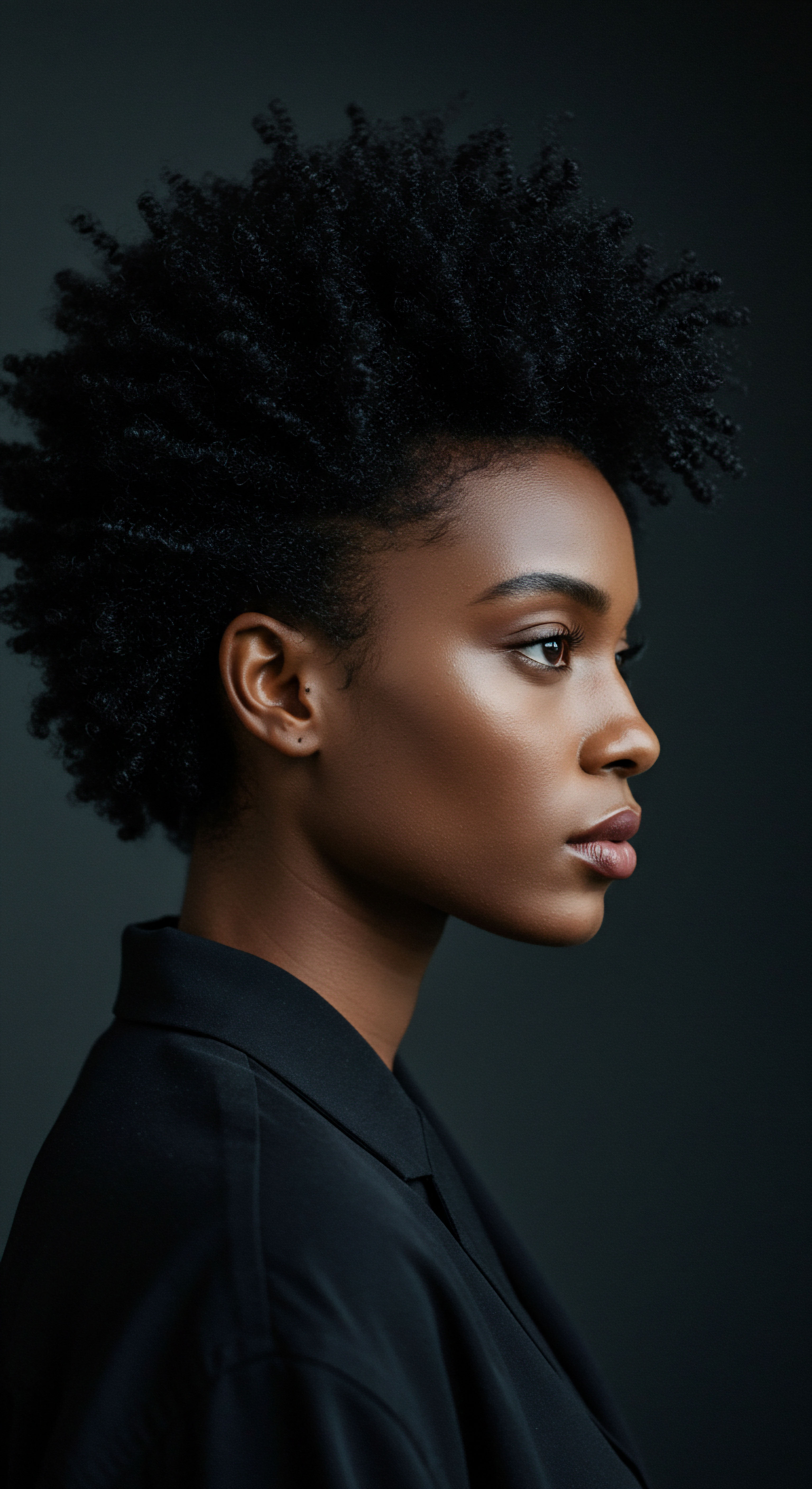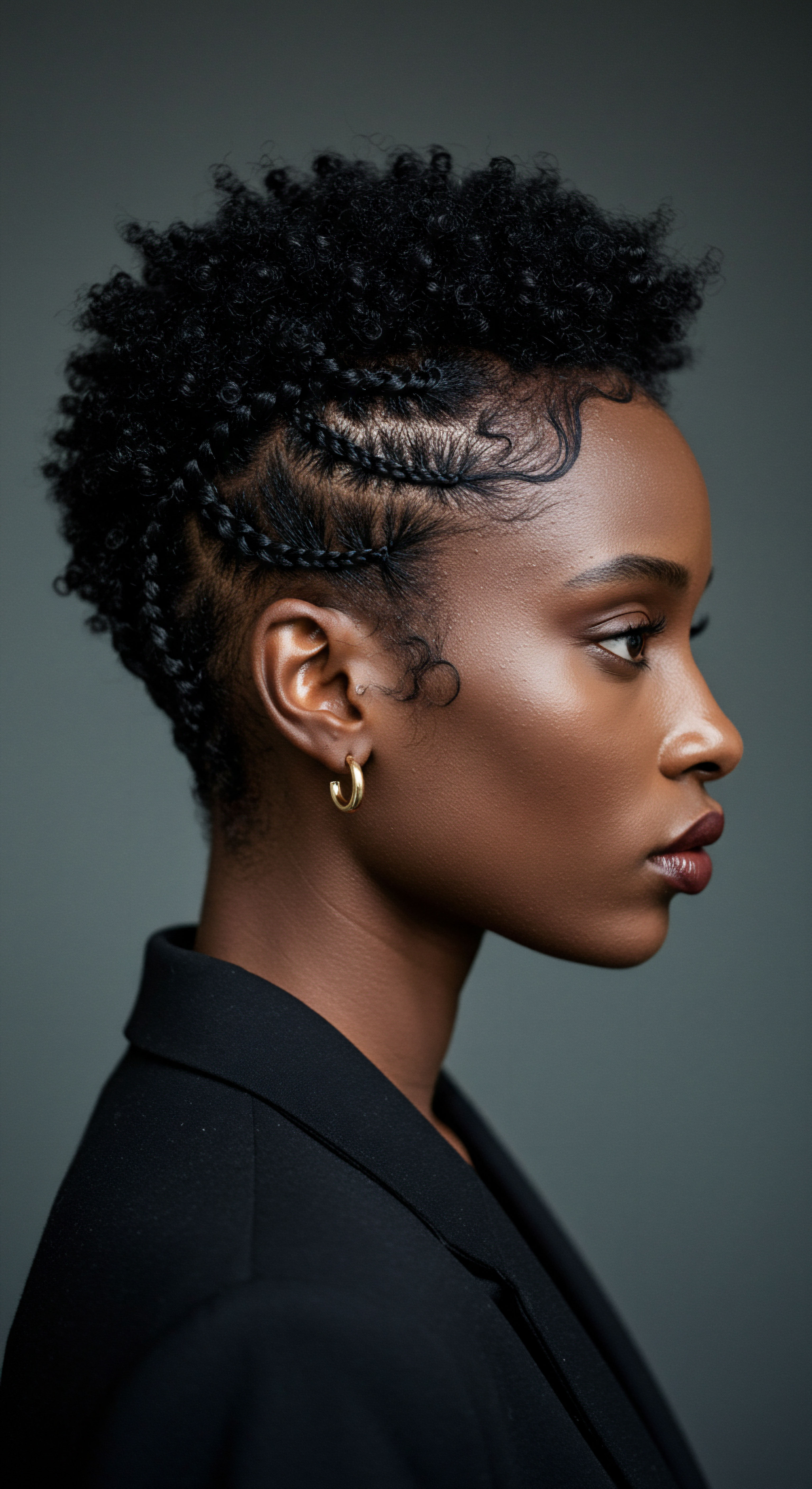
Roots
The quiet moments of rest, those hours when the world softens and our bodies seek repose, hold a profound, often unseen influence over our very being. It is within this sacred time that cellular symphony plays, orchestrating repair and renewal across every system, including the delicate ecosystem of our scalp. When sleep eludes us, when the night hours dwindle and true rest becomes a distant echo, a ripple effect begins.
This ripple extends deep within, touching the intricate dance of our hormones, those powerful messengers that guide so many of our body’s functions. For our hair, particularly textured hair, which possesses its own unique rhythms and requirements, these hormonal shifts carry a particular weight.
Understanding the specific hormonal responses to sleep deprivation, and how they intimately connect with scalp vitality, is akin to tracing the roots of a grand tree. The visible branches and leaves, our hair strands, rely on the unseen network beneath – the health of the scalp and the balanced flow of internal signals. Our journey into this connection will unveil how sleep, or its absence, can whisper secrets to our strands, influencing their strength, growth, and overall well-being.

The Body’s Internal Clock and Hair’s Rhythm
Our bodies operate on a remarkable internal clock, the circadian rhythm, which harmonizes countless physiological processes with the natural cycle of day and night. Sleep is a cornerstone of this rhythm, a period when the body prioritizes essential functions like growth and repair. For hair, this means the hair growth cycle itself, with its distinct phases of growth (anagen), transition (catagen), and rest (telogen), is closely aligned with our sleep patterns. Disruptions to this internal clock, often a direct consequence of insufficient sleep, can send confused signals to the hair follicles, those tiny powerhouses beneath the scalp surface responsible for producing each strand.
Consider the profound connection ❉ during deep, restorative sleep, the body experiences a peak in reparative activities. This includes the skin, and by extension, the scalp. Improved circulation and reduced levels of stress hormones create an environment conducive to cellular renewal. Poor sleep, conversely, can inhibit these cyclical processes, potentially affecting the “reset” phase for hair follicle stem cells, which are responsible for regenerating hair.
The delicate balance of our body’s internal clock significantly shapes the vitality of our hair.

How does a Disrupted Circadian Rhythm Influence Hair Follicle Activity?
A misaligned circadian rhythm, frequently seen with chronic sleep deprivation, can directly impact the activity of hair follicle stem cells. These remarkable cells, nestled within the hair follicle bulge region, are the engines of regrowth. Each time an old hair sheds, these cells are meant to activate, initiating the growth of a new hair shaft.
Research indicates these stem cells are highly sensitive to micro-environmental changes, including hormonal fluctuations, levels of oxidative stress, and inflammatory signals. When sleep is consistently inadequate, the body’s natural regenerative capacity is hindered, potentially leading to thinner, weaker hair over time.
For instance, a 2019 study published in Cell Reports drew a clear link between circadian rhythm disruptions, such as those experienced by night shift workers, and decreased stem cell activity within hair follicles. This finding underscores how profoundly our sleep schedule can dictate the very cellular machinery that supports hair growth, extending beyond mere cosmetic concern to a fundamental biological process.

Hormonal Orchestration of Hair Growth
Hair growth is a complex process, not simply a matter of external care. It is a finely tuned orchestration guided by a symphony of hormones, each playing a distinct role in the hair’s life cycle. When sleep deprivation enters the scene, it introduces discord into this hormonal harmony, impacting the signals that dictate when hair grows, rests, or sheds.
- Growth Hormone ❉ This hormone, primarily released during deep sleep, is crucial for cell regeneration and tissue repair throughout the body, including the hair follicles. Adequate sleep ensures its optimal release, supporting the anagen (growth) phase of the hair cycle. When sleep is scarce, so too is the restorative influence of this hormone.
- Melatonin ❉ Widely known for regulating sleep-wake cycles, melatonin also plays a surprising, yet significant, role in hair health. It acts as a potent antioxidant, protecting hair follicles from oxidative stress that can cause damage and poor hair health. Melatonin also possesses receptors within hair follicles, influencing their growth and rest phases, potentially by prolonging the active growth stage. Lowered melatonin levels due to sleep loss can thus directly impair hair growth.
- Cortisol ❉ This hormone, often called the body’s primary stress hormone, is a critical player in our survival responses. While beneficial in acute situations, chronic elevation of cortisol, a common consequence of sleep deprivation, becomes detrimental to hair. High cortisol levels can prematurely push hair follicles from the active growth phase into the resting (telogen) phase, leading to increased shedding, a condition known as telogen effluvium. This hormonal imbalance can also reduce the synthesis of important skin elements like hyaluronan and proteoglycans, which are vital for a healthy scalp environment.
The interplay of these hormones, when disrupted by a lack of sleep, creates a cascade of effects that can diminish scalp vitality and compromise hair integrity. The body, in its wisdom, prioritizes core survival functions during stress, and hair growth, while important for well-being, often takes a back seat.

Ritual
As the day fades and the world settles into its quiet hum, we often seek familiar patterns to guide us towards rest. These evening rituals, whether a warm bath, a gentle book, or simply dimming the lights, are more than mere habits; they are an invitation to our bodies to transition from the day’s demands to the night’s restoration. Yet, the subtle power of these routines, particularly their connection to the delicate dance of hormones that shape our scalp’s well-being, often remains unseen. Our hair, a reflection of our internal state, responds deeply to the rhythm of our lives, and the quality of our sleep forms a significant part of this rhythm.
The practical wisdom of tending to our hair and ourselves before sleep is not simply about appearance; it holds a deeper purpose, influencing the very hormonal landscape that nourishes our strands. When sleep becomes a fleeting guest, the intricate systems that support hair vitality can falter, leading to changes that speak volumes about our body’s internal struggle.

The Hormonal Cascade of Sleeplessness
When sleep is insufficient, a cascade of hormonal responses begins, impacting the scalp and hair in subtle, yet significant, ways. The body, sensing a state of stress, alters its internal chemistry, diverting resources and shifting priorities.

How do Sleep-Deprived Hormonal Shifts Affect Hair’s Resting Phase?
One of the most immediate and noticeable hormonal responses to sleep deprivation is the elevation of Cortisol. This “stress hormone,” while essential for managing acute threats, becomes problematic when chronically elevated. When sleep is consistently disrupted, cortisol levels remain high, sending signals to the hair follicles that can prematurely usher them into the telogen, or resting, phase. Normally, only a small percentage of hair follicles are in this resting phase at any given time, allowing for continuous hair coverage.
However, with increased cortisol, a greater number of follicles enter this dormant state, leading to increased shedding and a noticeable thinning of hair. This condition, known as telogen effluvium, often manifests as excessive hair fall when washing or brushing.
Furthermore, chronic stress, often a companion to sleep deprivation, can lead to inflammation throughout the body, including the scalp. This inflammatory state can damage hair follicles and disrupt their normal growth cycles. The heightened levels of pro-inflammatory cytokines, such as TNF-α, which are elevated during sleep deprivation, can promote cellular damage and contribute to scalp conditions like seborrheic dermatitis, characterized by red patches and flakes. Such an environment is far from ideal for hair vitality.
| Hormone Cortisol |
| Normal Function for Hair Stress response, metabolic regulation |
| Impact of Sleep Deprivation Elevated levels push follicles into resting phase, increase shedding (telogen effluvium), reduce essential skin elements. |
| Hormone Melatonin |
| Normal Function for Hair Sleep regulation, antioxidant protection, hair growth stimulation |
| Impact of Sleep Deprivation Reduced levels impair hair growth cycle timing, decrease antioxidant defense, potentially shorten active growth phase. |
| Hormone Growth Hormone |
| Normal Function for Hair Cell regeneration, tissue repair, hair follicle growth |
| Impact of Sleep Deprivation Impaired release during deep sleep, hindering hair follicle restoration and active growth. |
| Hormone Estrogen |
| Normal Function for Hair Supports active growth phase, hair thickness, follicle protection |
| Impact of Sleep Deprivation Imbalances can shorten active growth, leading to thinning and increased shedding, particularly in women. |
| Hormone Thyroid Hormones |
| Normal Function for Hair Regulate metabolism, influence hair cycle |
| Impact of Sleep Deprivation Disruption due to poor sleep can lead to overall hair thinning or breakage. |
Beyond the direct hormonal effects, sleep deprivation also impacts scalp microcirculation. Hair follicles rely on a steady, robust supply of oxygen and nutrients delivered through the bloodstream for optimal growth. When sleep is disrupted, blood flow to the scalp can be hindered, depriving follicles of the nourishment they require to thrive, potentially resulting in weaker hair and increased hair fall.
A scarcity of sleep can derail the body’s hormonal equilibrium, leading to noticeable shifts in hair vitality.

Supporting Scalp Health Through Sleep Practices
Recognizing the profound connection between sleep and hair health, cultivating intentional evening practices becomes a meaningful act of self-care. These rituals are not just about calming the mind, but about actively supporting the hormonal balance and cellular repair that our hair needs to flourish.
- Consistent Sleep Schedule ❉ Establishing a regular bedtime and wake-up time, even on weekends, helps to regulate the body’s natural circadian rhythm. This consistency aids in the balanced production of hormones like melatonin and growth hormone, which are essential for hair growth and repair.
- Mindful Wind-Down ❉ Reducing exposure to blue light from screens at least an hour before bed can significantly improve melatonin production. Engaging in calming activities such as reading, gentle stretching, or a warm bath signals to the body that it is time to unwind, helping to lower cortisol levels naturally.
- Protective Hair Measures ❉ While the internal hormonal dance is paramount, external practices also play a role. Using a Silk or Satin Pillowcase can reduce friction on hair strands as we move during sleep, minimizing breakage and frizz, especially for textured hair. Installing a loose, protective style before bed, such as a loose bun or braid, can also safeguard strands from tangling and breakage.
These deliberate steps contribute to a sleep environment that supports the body’s natural restorative processes, indirectly fostering a more favorable hormonal landscape for scalp vitality.

Relay
To truly comprehend the intricate dance between sleep and scalp vitality, we must move beyond the surface and delve into the profound depths where biological systems intersect with lived experience. The question of how specific hormonal responses to sleep deprivation affect our hair is not a simple query; it is a gateway to understanding the delicate equilibrium that sustains our well-being, a balance often challenged by the rhythms of modern life. This exploration invites us to consider not just the obvious, but the subtle, interconnected threads that link our rest to the very resilience of our strands.
The impact of sleep deprivation on hormonal regulation is a sophisticated subject, reaching into the very core of cellular function and genetic expression within the hair follicle. We recognize that textured hair, with its unique structural properties and often greater susceptibility to moisture loss and breakage, may experience these hormonal imbalances with particular intensity, necessitating a deeper, more nuanced understanding.

Hormonal Signals and Hair Follicle Stem Cell Quiescence
The hair growth cycle, a continuous process of growth, regression, and rest, is precisely regulated by a complex interplay of internal and external signals. At the heart of this regeneration lie hair follicle stem cells. When sleep is chronically insufficient, the hormonal environment shifts, influencing these critical stem cells.

How does Sleep Debt Alter the Hormonal Milieu Impacting Hair Follicle Stem Cells?
Chronic sleep deprivation leads to sustained elevation of Cortisol, the primary stress hormone. This prolonged presence of high cortisol has a direct, suppressive effect on hair follicle stem cells. Research by Dr. Ya-Chieh Hsu’s team at Harvard University, supported in part by the NIH, shed significant light on this mechanism.
Their studies, initially in mice, revealed that elevated corticosterone (the rodent equivalent of cortisol) prevents the dermal papilla—a cluster of cells beneath the hair follicle—from secreting a molecule called GAS6. GAS6 is essential for activating hair follicle stem cells, signaling them to exit their resting phase and begin producing new hair.
When mice were subjected to mild, chronic stress, mirroring prolonged sleep debt, their corticosterone levels increased, and their hair follicles remained in an extended resting phase, inhibiting hair regrowth. Crucially, administering GAS6 to these mice restored hair growth, underscoring the specific molecular pathway through which stress hormones, exacerbated by sleep deprivation, can directly halt the regenerative capacity of hair follicles. This represents a profound shift in understanding, moving beyond general “stress” to a specific hormonal and molecular blockade of hair regeneration.
Moreover, high cortisol levels have been shown to reduce the synthesis and accelerate the degradation of vital skin elements, namely hyaluronan and proteoglycans, by approximately 40%. These components are crucial for maintaining the extracellular matrix of the scalp, providing structural support and hydration essential for healthy hair follicle function. A compromised scalp environment, directly linked to elevated cortisol from sleep deprivation, further impedes the hair’s ability to thrive.
Chronic sleep deprivation triggers a specific hormonal cascade, notably elevated cortisol, which directly impedes hair follicle stem cell activation and regeneration.

Oxidative Stress and Microvascular Compromise
Beyond direct hormonal signaling, sleep deprivation also ushers in a state of increased oxidative stress and can compromise the microcirculation of the scalp, both of which have profound implications for hair vitality.

What is the Interplay of Sleep Deprivation, Oxidative Stress, and Scalp Microcirculation?
Sleep serves as a period of crucial antioxidant defense. When sleep is curtailed, the body experiences an imbalance between the production of reactive oxygen species (ROS) and its antioxidant defenses. This leads to heightened Oxidative Stress. ROS can damage cellular macromolecules, including lipids, proteins, and DNA, triggering a chain reaction that results in cellular damage and inflammation.
For the scalp, this means direct damage to hair follicles and the surrounding tissues, hindering their proper function and contributing to poor hair health. Oxidative stress has also been linked to premature hair graying, as it can reduce the function of melanocytes, the cells responsible for hair pigmentation.
Concurrently, sleep deprivation can negatively affect blood circulation throughout the body, including the scalp. Hair follicles are highly metabolically active and require a steady, rich supply of oxygen and nutrients delivered via robust microcirculation for optimal growth and function. When sleep is consistently insufficient, this vital blood flow can be restricted, depriving hair follicles of the nourishment they need. This lack of adequate supply can lead to weaker strands, slowed growth, and increased shedding.
A less commonly discussed aspect is the potential sex differences in microvascular reactivity to sleep restriction. While research in this specific area is limited, a study on macro- and microvascular reactivity during repetitive exposure to shortened sleep found that men and women responded differently, with women showing a mild inflammatory response and men exhibiting more vascular system sensitivity to repetitive sleep restriction. While this study did not directly measure scalp microcirculation or hair health, it suggests that the physiological consequences of sleep deprivation, including vascular changes, might manifest uniquely based on biological sex, potentially influencing hair health in distinct ways.
The systemic inflammation and oxidative stress induced by chronic sleep deprivation create a hostile environment for hair follicles. Pro-inflammatory cytokines, such as TNF-α and IL-1β, are elevated, further damaging follicles and potentially exacerbating conditions like alopecia areata, an autoimmune disorder where the immune system attacks hair follicles. This creates a vicious cycle where poor sleep fuels inflammation, which in turn compromises hair health.

Beyond the Usual Suspects ❉ Other Hormonal Influences
While cortisol and melatonin are often highlighted, other hormones also play a subtle yet significant role in hair vitality, and their balance can be disrupted by sleep patterns.
- Sex Hormones (Estrogen and Androgens) ❉ Estrogen, a primary female sex hormone, supports the active growth phase of hair follicles, promoting thicker and more robust strands. Imbalances in estrogen levels, such as those experienced during menopause or other hormonal fluctuations, can lead to a shortened growth phase and increased shedding, a situation that can be worsened by poor sleep. While sleep deprivation in military recruits has been shown to lower testosterone levels, it was not directly linked to changes in DHT (dihydrotestosterone), the androgen primarily associated with male pattern baldness. However, overall hormonal balance is crucial, and sleep disruption can indirectly influence these delicate systems.
- Prolactin ❉ This hormone, primarily known for its role in milk production, also influences hair growth. Its levels can increase during pregnancy, and it has been observed to affect hair by increasing free testosterone and decreasing DHT. While direct links between sleep deprivation and prolactin’s specific impact on scalp vitality are less explored, the broader disruption of the endocrine system by poor sleep suggests potential downstream effects.
- Thyroid Hormones ❉ These hormones are critical for regulating metabolism and influence the hair cycle. Disruption in thyroid hormone balance, which can be influenced by overall bodily stress and sleep quality, can contribute to hair thinning or breakage.
The interconnectedness of these hormonal systems means that a disturbance in one, triggered by sleep deprivation, can send ripples throughout the entire endocrine network, ultimately affecting the micro-environment of the scalp and the resilience of our hair.
Consider the broader context of stress and its physiological manifestation. In a study examining stress and hair loss, researchers noted that stress can prompt the body to conserve nutrients for core functions, effectively deprioritizing hair growth. This systemic shift, driven by hormonal signals from inadequate sleep, underscores how deeply integrated our hair health is with our overall physiological state.

Reflection
The journey through the subtle yet powerful connections between sleep, hormones, and scalp vitality reveals a profound truth ❉ our hair, in all its unique texture and beauty, is a living testament to our internal landscape. It responds not only to the products we apply but to the quiet, unseen rhythms of our deepest rest. When sleep becomes a fleeting visitor, the body’s delicate hormonal symphony can falter, sending signals that echo through our strands, influencing their very resilience and luster.
To truly honor our hair, then, is to honor our need for restorative sleep, allowing the body to recalibrate, repair, and renew from within. This understanding invites a gentle, yet powerful, shift in perspective, recognizing that true hair wellness begins long before any product touches our scalp, nestled within the quiet hours of profound repose.

References
- Baron, Elma D. et al. “Effects of sleep deprivation on skin health.” Journal of the American Academy of Dermatology, 2019.
- Hsu, Ya-Chieh, et al. “Corticosterone inhibits GAS6 to govern hair follicle stem-cell quiescence.” Nature, 2021.
- Dattner, Aaron. “Stress and the Hair Growth Cycle ❉ Cortisol-Induced Hair Growth Disruption.” Journal of Drugs in Dermatology, vol. 15, no. 8, 2016, pp. 1001-1004.
- Oh, Ju Hee, et al. “Melatonin Promotes Hair Growth by Inducing Anagen Phase and Inhibiting Apoptosis in Hair Follicles.” Journal of Investigative Dermatology, 2012.
- Fischer, Tobias W. et al. “Melatonin increases anagen hair in women with androgenetic alopecia or diffuse hair loss ❉ results of a prospective, randomized, placebo-controlled study.” British Journal of Dermatology, vol. 150, no. 2, 2004, pp. 341-345.
- Rushton, D. H. “Nutritional factors and hair loss.” Clinical and Experimental Dermatology, vol. 27, no. 5, 2002, pp. 396-404.
- Kwon, O. S. et al. “The role of growth hormone in hair follicle development and growth.” Journal of Dermatological Science, vol. 59, no. 1, 2010, pp. 1-9.
- Hasan, Irfan, et al. “Sleep deprivation and chronic pain ❉ role of oxidative stress.” Journal of Pain Research, 2024.
- Arck, P. C. et al. “Stress and the hair follicle ❉ exploring the impact of the brain-skin axis.” Experimental Dermatology, vol. 18, no. 12, 2009, pp. 1017-1025.
- Peters, Eva M. J. et al. “Stress-induced changes in hair growth and pigment formation.” Journal of Dermatological Science, vol. 35, no. 1, 2004, pp. 1-8.
- Baron, Elma D. et al. “Skin health in night shift workers.” International Journal of Dermatology, 2019.
- Reid, Kathryn J. et al. “Sleep and its impact on the human body.” Journal of the American Medical Association, 2010.
- Alonso, L. and Fuchs, E. “The hair follicle ❉ a pluri-potent stem cell niche.” Differentiation, vol. 72, no. 8, 2004, pp. 433-441.
- Guo, S. and DiPietro, L. A. “Factors affecting wound healing.” Journal of Dental Research, vol. 89, no. 3, 2010, pp. 219-229.
- Patel, Deepa, et al. “The Role of Nutrition in Hair Loss.” Dermatology and Therapy, vol. 9, no. 3, 2019, pp. 381-392.